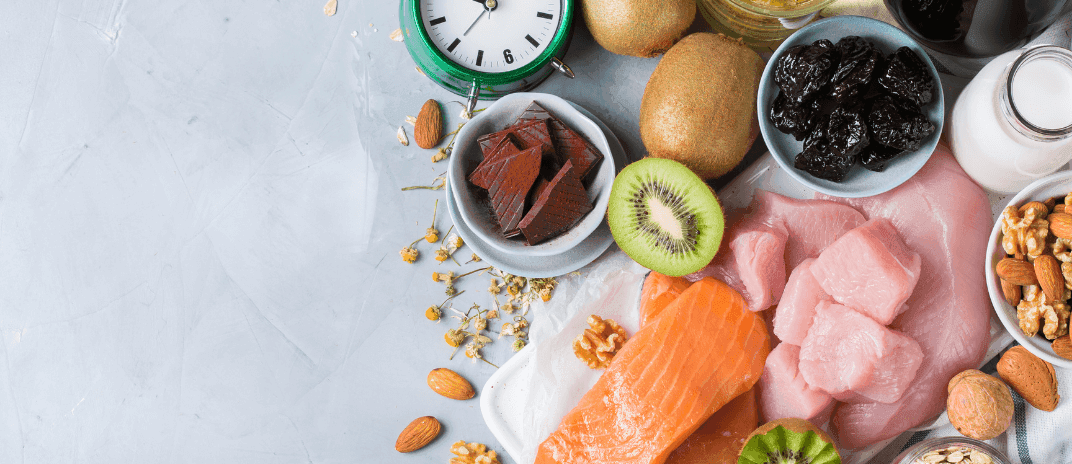


You’ve probably seen or heard about melatonin when you are in the supplement aisle of a pharmacy or on social media platforms. Melatonin is a natural hormone produced by our body to regulate our body’s natural circadian rhythm and promote better sleep quality. If you struggle with insomnia, one solution is to eat foods with melatonin.
But what foods are rich in melatonin? Keep reading to learn the top 10 foods with high levels of melatonin.
Melatonin is a natural sleep hormone produced in the pineal gland of the brain. It helps to regulate the sleep-wake cycle by interacting with a part of the brain called the suprachiasmatic nucleus (SCN) [1].
The SCN is sensitive to light and darkness. This means that when there is light, the SCN will send a signal to the pineal gland to stop the production of melatonin, so you feel awake. When it is dark, it will send a signal to increase melatonin production to make you sleepy [2].
In doing so, it ensures that we get more restful sleep at night and reduces daytime sleepiness.
Below is a list of the top 10 melatonin-rich foods to eat before bed.
Melatonin levels: 13.46 +/- 1.10 ng/g
All types of cherries contain melatonin. However, based on studies, it was found that Montmorency tart cherries contain the most amount of natural melatonin compared to other types [3].
You can consume tart cherries for sleep in several different ways. Many people like to use tart cherries when making cherry pies or pastries, or consuming it as a juice.
Two cups of tart cherry juice contains 3 grams more melatonin than a typical melatonin supplement [4].
Melatonin levels: 123.44 and 1600.48 ng/g
Goji berries have the highest amount of melatonin of any berry, according to a study that compared the melatonin content of various berries [5].
Goji berries can be consumed either in their raw form, in drinks like herbal teas or juice, in bakes, or in soup.
It is a versatile ingredient that can be incorporated into both drinks and dishes, whichever you prefer.
Melatonin levels: 82.3 ± 6.0 ng/g
Cereals like barley contain a good amount of melatonin, making it an effective sleep aid to help you fall asleep faster.
You can easily incorporate barley into your diet by adding it to soups, and stews, or even using it as a base for salads. It is mild and versatile, making it great to include in a variety of dishes.
Melatonin levels: 90.6 ± 7.7 ng/g
Oats is another cereal option that contains a relatively high amount of melatonin for a cereal.
Besides being used to improve sleep patterns, it also contains fiber, vitamin B, and other minerals that are essential for a healthy diet [6].
With oats, you can make yourself a simple bowl of oatmeal that is sweet or savory. You can also add it to a smoothie blend or prepare them as overnight oats.
Melatonin levels: 11.26 ± 0.13 ng/g
Other than cherries, strawberries are one of the highest melatonin fruits [7]. This can help to promote healthy sleep.
You can pair strawberries with your favorite kind of yogurt, add it to a smoothie, or eat them as it is for a sweet and satisfying snack.
Melatonin levels: 11.9 ng/g to 93.4 ng/g
Bell peppers, as part of the capsicum family, are a type of fruit that is commonly used in different cuisines for flavor.
Beyond its vibrant color and crunchy texture, it is a natural source of melatonin which helps to improve sleep.
You can easily add bell peppers to your meals by tossing them into salads, stir-fries, or roasting them as a side dish. It is an ingredient that not only helps to enhance the flavor profile of your dish but also contributes to you getting a good night’s sleep.
Melatonin levels: 3.7 ± 0.21 ng/g
Fatty fish such as salmon, mackerel, and sardines are not only rich in omega-3 fatty acids and vitamin D but also rich in melatonin, which can help you regulate your sleep-wake cycle.
Including fatty fish in your diet, grilled, baked, or pan-seared can be an effective and delicious way to promote good sleep.
Melatonin levels: 23.87 ± 2.02 ng/g
Tomatoes, a staple in many diets worldwide, are not only versatile and flavorful but also a natural source of melatonin.
With melatonin levels at 23.87 ± 2.02 ng/g, tomatoes can play a role in promoting better sleep.
Whether you enjoy them fresh in a salad, cooked into a sauce, or as a juice, incorporating tomatoes into your diet can contribute to a more restful night’s sleep.
Melatonin levels: 2,900 ± 770 ng/g for saffron milkcap mushrooms, 6800 ± 60 ng/g for porcini mushrooms
Mushrooms are excellent sources of melatonin, especially the saffron milkcap and porcini varieties. Including these types of mushrooms in your meals can provide a significant boost in melatonin intake.
You can enjoy them sautéed, grilled, or added to soups. These mushrooms offer a tasty and nutritious way to help regulate your sleep patterns.
Melatonin levels: 233,000 ng/g
When it comes to melatonin content, pistachios boast an impressive amount at 233,000 ng/g dry weight, making them one of the richest natural sources of melatonin.
By just eating a handful of pistachios, you can significantly increase the melatonin levels in your body, helping you sleep better. You can eat it as part of a snack or include it as a side dish.
Apart from melatonin’s role in regulating the circadian rhythm, the production of melatonin can also help to reduce the time it takes for you to fall asleep.
It is beneficial for those experiencing insomnia or having difficulties falling asleep due to an irregular sleep schedule or jet lag [8].
Low levels of melatonin can lead to various sleep and health issues. It can be caused by age, stress, certain medications (e.g. beta-blockers or NSAIDs), or irregular sleep-wake routines (e.g. shift work)
Here are some common signs that you may have low melatonin levels:

Melatonin supplements are becoming a popular sleep aid with an increasing number of adults resorting to over-the-counter supplements for sleep [9].
According to a 2018 study, Americans are now taking more than twice the amount of melatonin compared to a decade back [10].
According to the National Institutes of Health, using melatonin supplements on a short-term basis to cope with insomnia, jet lag or delayed sleep-wake phase disorder is generally safe. It may also be useful for children dealing with sleep disorders [11].

That being said, melatonin supplements should not be used on a long-term basis as current evidence on long-term safety is still lacking.
Additionally, if you fall under these categories, you should avoid taking melatonin unless cleared by your doctor:
In these situations, there is not enough research on the safety and there could be a negative drug interaction if you are on an existing medication.
Eating melatonin-rich foods is one of the best ways to get a restful night’s sleep naturally. Whether it is consuming fruits like cherries and strawberries or foods like fatty fish or mushrooms, you can easily incorporate them into your diet to enhance sleep quality.
To get better sleep naturally, check out our patented sleep-tracking app, ShutEye®. The app offers personalized tips to help you sleep better, based on your sleep quality report.
Burkhardt, S., Tan, D. X., Manchester, L. C., Hardeland, R., & Reiter, R. J. (2001) Detection and quantification of the antioxidant melatonin in Montmorency and Balaton tart cherries (Prunus cerasus). Journal of agricultural and food chemistry, 49(10), 4898–4902. Available at: https://doi.org/10.1021/jf010321+
Chukar (2024) Which Cherries Have the Most Melatonin? [online]. Available at: https://www.chukar.com/which-cherries-have-the-most-melatonin
John Hopkins Medicine (2024) Melatonin for Sleep: Does It Work? [online]. Available at: https://www.hopkinsmedicine.org/health/wellness-and-prevention/melatonin-for-sleep-does-it-work
John Hopkins Medicine (2024) Sleep/Wake Cycles [online]. Available at: https://www.hopkinsmedicine.org/health/conditions-and-diseases/sleepwake-cycles
LaMotte, S. (2023) Using melatonin for sleep is on the rise, study says, despite potential health harms [online]. Available at: https://edition.cnn.com/2022/02/01/health/melatonin-overuse-wellness/index.html
Li J, Somers VK, Xu H, Lopez-Jimenez F, Covassin N. Trends in Use of Melatonin Supplements Among US Adults, 1999-2018. JAMA. 2022;327(5):483–485. Available at: doi:10.1001/jama.2021.23652
Merschel, M. (2022) Take a fresh look at oatmeal – it's not as simple as you think [online]. Available at: https://www.heart.org/en/news/2022/09/01/take-a-fresh-look-at-oatmeal-its-not-as-simple-as-you-think
National Center of Complementary and Integrative Health (2024) Melatonin: What You Need To Know [online]. Available at: https://www.nccih.nih.gov/health/melatonin-what-you-need-to-know
Savage, R. A., Zafar, N., Yohannan, S., & Miller, J. M. (2024). Melatonin. StatPearls - NCBI Bookshelf. Available at: https://www.ncbi.nlm.nih.gov/books/NBK534823/
Stürtz, M., Cerezo, A. B., Cantos-Villar, E., & Garcia-Parrilla, M. C. (2011). Determination of the melatonin content of different varieties of tomatoes (Lycopersicon esculentum) and strawberries (Fragariaananassa). Food chemistry, 127(3), 1329–1334. Available at: https://doi.org/10.1016/j.foodchem.2011.01.093
Uğur, Y. (2021). INVESTIGATION OF MELATONIN CONTENT AND ANTIOXIDANT CAPACITY IN GRAPE BERRIES. İnönü Üniversitesi Sağlık Hizmetleri Meslek Yüksek Okulu Dergisi, 9(3), 820-830. Available at: https://doi.org/10.33715/inonusaglik.987625